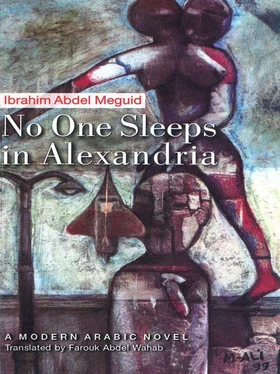
Thus, after having seen the sea and the big squares with Sitt Maryam, Zahra entered Alexandria’s magic world. Umm Hamidu’s stories have given the city, whose inhabitants were leaving, a warm soul in a winter that now appeared truly frosty. But after the rain fell, warmth prevailed, spaces grew wider, and the sky moved higher, bluer, happier. Alexandria has always been a happy city, despite the apparent malaise because of the migration. Umm Hamidu’s stories made it twice as happy. The rain, which had not stopped in days, would surely let up with the beginning of the new year, when the Christian and Muslim holidays would coincide for the first time in many years: the Orthodox Christmas would be on the same day as the Feast of the Sacrifice. If the rain did not stop, however, it would fall on Muslims and Christians alike, and there would be joy for all and rain for all, and even Epiphany, which Yvonne had said the previous year was an ancient Egyptian feast, would be for all.
Orders were given throughout the country that the new year be celebrated, but without lighting up the streets, and people were warned about the possibility of surprise air raids. For even though the combatants in Europe had announced a cease-fire on the last day of the year, no one could guarantee the actions of Hitler and Mussolini, especially since “our country has no interest in the European celebrations of the birth of Christ, it being an innovation that came with the occupation.” At any rate, the raids had stopped in Europe on the penultimate day of December, in view of bad weather conditions, so people in Europe enjoyed two days in a row without raids. That was a particularly welcome respite for the British, whose cities Hitler had vowed to wipe out. The night of the thirtieth of December, however, witnessed intensive British air raids on the Gazala and Tobruk airports in Libya. Italian airplanes in turn attacked the British bases in Malta.
The world was still following the surprising advances of the Greeks in Albania, at the Italians’ expense and amid the confusion of the Albanians themselves, who had not yet settled on one occupier of their land. The Führer addressed a message to the German army in which he enumerated Germany’s triumphs during the past year and promised final victory in the new year. “The German Army of National Socialism has achieved brilliant victories in the year 1940. This army, on the threshold of a new year, has prepared itself with armaments hitherto unknown to humanity.”
In Cairo, Biba Izz al-Din announced that she would open her new program at the Majestic Theater with the play Who Are You Kidding? which would include singing monologues by Muhammad Abd al-Muttalib, Fathiya Mahmud, Thurayya Hilmi, and Sayyid Fawzi. The Shatbi Casino announced it would open its doors for new year’s celebrations. Celebrants, mostly Commonwealth soldiers, danced to love serenades at the Monsignor in dim lights that did not show outside because of the tinted glass and heavy curtains. Neither Magd al-Din nor Zahra understood, for the second time, why people threw their old things from the windows at year’s end, even though it was a small number of people who did, as most had left in the great emigration.
In Cairo, King Farouk attended a new year’s party at the opera house for the entertainment of the English soldiers in the Middle East. The Wafd Party submitted to him a statement of opinion on internal and external affairs in Egypt, criticizing both. The Royal Air Force in the Middle East resumed its bombing of Gazala and Bardiya in Libya. The month of December had witnessed a ferocious surprise attack by the suntanned British and Allied armored forces on Sidi Barrani, where they captured “Italian officers who filled five feddans and soldiers who filled two hundred feddans.” People once again wondered, as they saw the prisoner-of-war trains coming from the desert, whether the Italians were really fighting, or whether II Duce and Graziani were doing the fighting alone. By the middle of the month, the Italians had been thrown out of Egypt, and the Allied forces chased them to Bardiya, which had been penetrated by the Australian soldiers in their long heavy coats. They captured five thousand Italians. Air raids started again with the new year in Europe. The Germans used a new type of incendiary bomb on London that started infernal fires everywhere and left behind, after each raid, three to four thousand casualties or more. One bomb fell on the House of Commons and caused serious damage, though there were no politicians in it. The German city of Bremen was totally destroyed by British air raids. In Libya, the Australians, together with the English, had invaded and routed Tobruk, and thirty thousand Italians were taken prisoner, bringing the number of Italian prisoners of war to one hundred thousand. Thus the huge army collapsed and became a negligible military force. The Allied forces spread along the coast from Sallum to Buqbuq.
Yusuf Wahbi’s play The Air Raid Siren opened. Cinema Olympia screened the film Dananir, starring Umm Kulthum; Cinema Misr showed Mary Queenie’s A Rebellious Girl; and Cinema Cosmo was playing One Million Years B.C., which starred the new actor Victor Mature and which Camilla saw with Rushdi and saw in Rushdi’s eyes the same sadness as in Victor Mature’s. The Commandant of the Traffic Police, Muhammad Shukri Bey, issued an order requiring all cab drivers to wear a uniform as they did in European countries, a khaki coat over their clothes. In Alexandria the Israelite Sports Union had a gala party to benefit victims of the air raids, which was attended by Salvatore Cicurel and many other notables. Marshal Wavell’s reputation spread. In disbelief, people watched the sweeping British offensive on Libya and the defeats raining down on Italy.
But Magd al-Din believed, for he saw the weapons being shipped by train to the heart of the desert every day, weapons that only red demons could make and only devils and giants could use. Hamza expressed amazement as he saw the young Italian prisoners of war, barefoot and heads shaved, shipped in open and closed freight trains, looking more like homeless children, and sleeping without a care. Some of them even smiled at the workers or waved to them. Commenting on their great numbers, Hamza sang, “If time deals you a bad hand, son of noble ones, bow your head, but follow not the ignoble ones.” His co-workers, who could not see the connection between what he said and what was happening, laughed.
“Aren’t they the ones who were fighting?” Dimyan asked him.
“My heart tells me these are good-hearted men who don’t know how to fight in Egypt or Greece. It’s all the devil Mussolini’s fault,” was Hamza’s reply.
Roosevelt delivered a speech in which he said that America was going to be “the great arsenal of democracy.” The licensed prostitutes of Alexandria complained about the dwindling number of patrons after the great emigration from the city. They requested that they be used to entertain the English soldiers in their camps in return for a fixed income, since Commonwealth soldiers who went to the brothels went there drunk and did not pay. Besides, the local customers, knowing that they had become a rare commodity, were no longer going to the poor brothels in Farahda and Kom Bakir, but to the posh ones in Hamamil, and were paving there what they used to pay in the poor ones. The newspapers announced that mentally retarded persons in Germany and countries under German occupation would be executed: “In Germany alone, one hundred thousand wretched creatures, idiots, and incurably insane creatures will be executed in the next few days.” The workers laughed when Hamza said that only today he did not wish the Italians to enter Egypt because that meant that “the Germans would enter too, and execute all railroad workers like us.” When he saw Ghibriyal’s fox-like glance, he immediately added,”Except foremen,” and everyone laughed even more. Dimyan began to feel a spiritual affinity with Hamza, and Magd al-Din forgot his previous insult to him,
Читать дальше













